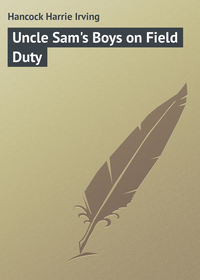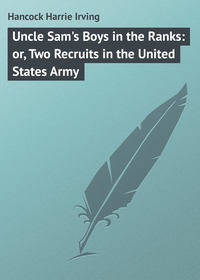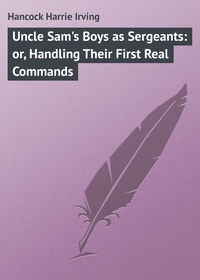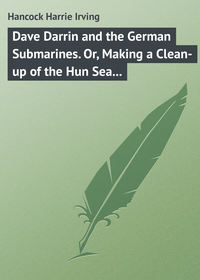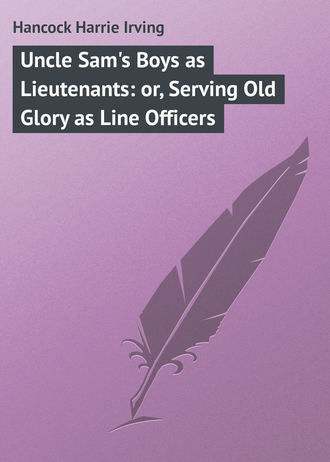
Uncle Sam's Boys as Lieutenants: or, Serving Old Glory as Line Officers
"And Captain Foster's is the next beyond," stated Lieutenant Sears.
CHAPTER IX
ORDERED TO FRONTIER DUTY
"YOU'VE all your equipment with you, Mr. Overton?" inquired Captain Foster, of H company, after the presentation had been made and Lieutenant Sears had withdrawn.
"Yes, sir."
"You'll want much of your time to-day for getting to rights in your quarters, Mr. Overton. You'll be required only to turn out for parade at the end of the afternoon. To-morrow you will enter fully upon your duties. Mr. Sears will post you thoroughly at mess this evening."
"Very good, sir."
"That is all I have in the way of instructions. Wait, and I'll see if I can find Mrs. Foster. I want you to meet her."
A few moments later Hal found himself chatting with Mrs. Foster, a very sweet little woman, some years younger than the captain. Hal took an instant liking to her. Mrs. Foster asked him much about his home folks, adding:
"As soon as you feel that you're settled in your new life and duties, Mr. Overton, I shall ask you to permit me to invite your mother here as my guest. I know that a mother always wants to see her son's life in the service."
"When that time comes, Mrs. Foster," the young officer answered, "you will be giving me the greatest happiness that can come to me."
"Well," pursued that good lady, "it will not take you so very long to get settled in your new duties. The time for your mother's visit need not be so very far away."
"You forget one thing, my dear," interposed the captain.
"And what is that?" questioned Mrs. Foster.
"You forget the Mexican rebels."
"Those barefooted, half-starved ragamuffins!" cried Mrs. Foster. "They can have nothing to do with our plans here at the post."
"On the contrary, they may be mischievous enough to upset the whole routine of garrison life. You have read something about the Mexican rebels, Mr. Overton?"
"I have seen a few paragraphs in the newspaper, sir," Hal answered. "Enough to know that some pretender in the country across the border is trying to upset the present government in his own interests."
"What do you think, Overton, about the chances of that rebellion?"
"As far, sir, as I have been able to form any opinion from the press accounts, it seems that only a few hundred of the rebels are in the field, and that they are spending most of their time in running away from the troops of the Mexican government."
"Ah, but the fact that the rebels are in the field, instead of in their graves, shows that their movement possesses some stability," replied Captain Foster. "The fact is that other Mexicans over here on the Texas side are organizing to go to the aid of the rebels just across the Rio Grande. Our government has information that the Mexican sympathizers in this state have secured a good many stands of rifles and a considerable supply of ammunition, and are watching their chance to slip over the border into Mexico with their war supplies. Now, the few hundred rebels at present in the field in Mexico may be joined by enough more Mexicans from this side to make an army of two or three thousand men. If so many get together under the standard of the rebel leader, then more thousands will flock in answer to the call. The rebel army may be ten thousand strong next week, and twenty thousand the week after."
"But surely," interposed Mrs. Foster, "this government will not allow the Mexican rebels on this side of the river to take their war supplies across the river into Mexico?"
"Not if our government can stop the operation," smiled Captain Foster. "But, my dear, how would the government stop it?"
"By the use of the troops, I suppose," replied Mrs. Foster.
"Exactly. And did you know that Wilshire's and Apthorpe's troops of cavalry have been ordered to patrol the border in small riding parties, for the very purpose of stopping such expeditions into Mexico?"
"No!"
"Nor did I, until Major Tipton informed me, only a little while ago. Further, Tipton has been directed to hold the troops at this post ready for work in patroling the frontier. That was why I just suggested that Mr. Overton will do well to wait until this border business has blown over before he encourages you to invite his mother. Mrs. Overton might arrive here only to find her son absent on several weeks of hard hiking."
"Am I discreet in asking you, Captain, whether you think it likely that this battalion will be called out for frontier patrol duty?" asked Lieutenant Hal.
"I think it highly likely that at least three-fourths of this command will soon be called out on such duty," replied the captain of H company.
Hal's eyes gleamed.
"You seem to like the prospect, my boy."
"I do, sir. Active service always appeals to me."
"You'll find it very active service," sniffed Mrs. Foster. "Nothing but a lot of hard, dusty marching, with insufficient food, little time to prepare it, and always matching wits with a lot of crafty, barefooted Mexicans!"
"Overton is right," contended the captain. "Despite the discomforts and possible hardships such work is excellent, both for soldiers and their officers."
"If anything of the sort comes," murmured Lieutenant Hal, "I certainly hope that I shan't be left out of it."
"You probably won't," replied Captain Foster dryly. "Major Tipton has been informed that both Mr. Terry and yourself have already distinguished yourselves in scouting work in the field. You will have use for such talents here, if we are called out to watch the border."
"It's stupid work," cried Mrs. Foster petulantly, "and it will spoil several of the good times that the ladies at this post have been planning."
"Now, we won't detain Mr. Overton any longer, my dear," remarked the captain. "Remember, Overton, parade this afternoon. No other duties for to-day."
Hal took his leave, returning, light-footed, to bachelor quarters. There he found Noll, returned before him.
"Nothing but parade for me to-day, Noll," Hal called to his chum.
"Same here," rejoined young Terry, opening his door. "May I come across into your house a little while?"
"I shall be glad to have you if you have no more to do than I appear to have. My striker appears to have put everything in apple-pie order. Sit down. How do you like the new station and the crowd?"
"Fine," nodded Noll. "Major Tipton appears to be just the right sort of commanding officer."
The instant that the first call for parade sounded Lieutenants Hal and Noll sprang from their chairs. Both were soon going down the stairs, their swords clanking at their sides. This parade, though unimportant in a sense, was their first actual duty as line officers. Both youngsters walked with a new dignity and erectness as they crossed to the parade ground.
They were the first officers to appear. When the actual parade call sounded the enlisted men of four companies came out in human streams from the barracks buildings.
Now the remaining officers of the garrison came briskly up while the first sergeants of the companies were attending to the formation.
At the proper moment the officers of the battalion went to their stations. As he drew his sword, for the first time in Uncle Sam's service, Lieutenant Hal felt a thrill the like of which he had never known before.
Neither youngster made a mistake during the maneuvers and ceremonies of parade. Though it was the first time that either had stood with troops as officers, they went through all the movements mechanically. They had not put in three years in the ranks for nothing.
Yet every moment, every movement of parade now had a new significance to the young lieutenants. Then, when it was all over, and the men dismissed, the officers returned to their quarters to prepare for dinner.
Hal and Noll reached mess ten minutes ahead of the dinner hour. Most of the officers who would dine at the club were already present.
"Mr. Sears," asked Hal, going over to his first lieutenant, "can you spare me a little time after dinner?"
"Easily, Overton. You want to ask me about the routine duties, I imagine."
"Yes. Captain Foster has ordered me to full duty beginning with to-morrow."
"Then we'll find seats in the reading room after dinner. It won't take very long to give you the schedule and the inside ropes."
In the Army punctuality is made a prime virtue for both officers and men. Hence there were no laggards at dinner. Every officer took his seat at the long table at the minute of 6.30. Hapgood, who was officer of the day, came in with his sword at his side; he placed that weapon in a handy corner.
"The evening's news is that the Thirty-fourth is back in Colorado," announced Lieutenant Brisbane, glancing down the table.
"Just before we started west we read that their transport had arrived at San Francisco," answered Noll.
"And Major Silsbee's first battalion is at its old station, Fort Clowdry," added Mr. Brisbane. "By way of further news I may add that Major Tipton told me, a few minutes ago, that Major Silsbee had been ordered by wire to hold his battalion in readiness for a call from this department."
"Mexican border troubles?" asked Lieutenant Hapgood.
"Yes."
"Then the government knows, better than we do, that the border trouble threatens to grow acute," remarked Lieutenant Sears. "It has been understood, I think, that troops from this post will be the first infantry ordered out to the support of the two cavalry troops now patroling."
"Oh, we'll get some of that barefoot business presently," grumbled Pratt. "A beastly job. The state of Texas ought to call out its police to take care of the matter."
"Except," remarked Sears dryly, "that it is the province of the United States, not of a single state, to preserve neutrality at the border."
"It's cases like this Mexican business that make a fellow wish that he belonged to the Navy," insisted Pratt. "If we go out, as doughboys, we'll have to tramp and hike until our shoes are full of sore feet, and all for nothing, perhaps. If we belonged to the Navy, and were ordered to patrol, we'd do it in a gunboat, and wouldn't care where we went, as we'd always be on our gunboat, with, good meals ready at the stroke of the bell, with baths, clean clothing, even easy chairs right at hand. The Navy can keep on patroling even while two-thirds of a crew are in their berths enjoying sweet sleep until the moment for action comes."
"Stop it," insisted Algy Ferrers. "Even in the Navy you'd find you'd have to work like a horse. There are no easy ways of getting through life, and a soldier ought not to look for 'em."
Pratt, who was a husky and sufficiently energetic young officer at need, and who had merely been exercising his right to grumble, flushed and was silent.
"I don't suppose Terry or myself will have the luck to be picked for this sort of border patrol work, if it comes," suggested Hal.
"Probably you'll be kept on post until you're more accustomed to your men," nodded Lieutenant Hapgood.
"Either way will suit me," said Noll. "I don't expect to have my pick of anything until I've served a few years more."
"You won't have it then either," laughed Sears.
The meal over, Sears retired into a corner with Hal. Johnson joined them with Noll. The two youngest officers in the regiment were handed printed slips containing the routine work of the day at Fort Butler, and also the hour for the call to each duty. Sears and Johnson added much more information.
"You'll come to us for anything else that you want to know, of course," said Sears, in conclusion. "You are aware, of course, that your superior officers are paid to answer questions."
"Thank you," acknowledged Hal.
It was soon nine o'clock, and the two Army boys, tired with their day of travel and of new life, left the club early, going directly to quarters and to Hal's room.
"I won't stay long," declared Noll, sinking into the easy chair that his chum pushed forward. "But I've simply got to talk a bit with you, bunkie, my head is so full of it all."
The chums chatted on until at last the notes of a bugle were borne to their ears.
"Listen!" cried Hal, holding up one hand, his eyes glowing. "The same good old Army taps!"
"We don't have to go to bed, since we added swords to our equipment," laughed Noll.
"No; but we had better turn in. We have as much work to do as any of the enlisted men."
An hour later, when all was quiet, there came a heavy pounding on Hal's door. As the young lieutenant awoke and leaped from his bed he was sure that he heard a similar commotion going on at Noll's door.
"Who is it?" called Hal, throwing on a bathrobe and going toward the hall door.
"Private Graham, of the guard, sir. Major Tipton's compliments to Lieutenant Overton, and the major directs that the lieutenant report immediately at headquarters."
Then, as Hal and Noll both opened their doors, the soldier added:
"Major Tipton authorized me to add, sir, that the Mexican border trouble has broken out, and that you'll both march soon with your men."
CHAPTER X
ON THE SCENE OF BORDER TROUBLE
THE speed with which a soldier can dress, and do it tidily, would astonish the average civilian.
Very soon after the call had sounded at their doors Hal and Noll, their swords hanging at their left sides and their revolvers belted on, stepped in at headquarters.
"Come right in, gentlemen," called Major Tipton, from the rear office.
Lieutenant Brandon, battalion adjutant, was already with his chief.
"Your first call has come sooner than you expected," smiled Major Tipton. "Captain Foster will be here presently, and then we will go over the matter together. Ah, Foster! Come right in."
Then the orders were made clear.
"The department commander has directed me to send one company, or its equivalent, up to the village of Agua Dulce," stated the major. "You know where the village is, Captain – about twenty miles up the river. You will start within the hour. Now, for the sake of giving our youngest officers practice in handling their men I am going to send the second platoons of F and H companies, and you, Foster, will command. You will take one wall tent for the officers, Captain, and the men will each carry their half of a shelter tent. You will take kitchen kit for one company, and fifty rounds of ammunition for each man – though I trust you will have no occasion to fire any shots. The quartermaster is now ordering out three escort wagons to accompany you. If your provisions run low you will receive more. You should be in camp, Captain, soon after daylight."
"Agua Dulce," continued Major Tipton, "as you know, is a village with a large proportion of Mexican population. The War Department is advised that the Mexican rebels are making the village an American headquarters for the insurrection. It will be your duty, Captain, to see that no armed parties or cargoes of munitions of war get across the river. You will very likely find that Mexican troops are stationed on the opposite side of the river. If you so find, you will act in harmony, as far as you can, with the commander of the Mexican troops."
"Very good, Major."
"I have already sent the guard to notify the first sergeants of F and H companies to turn out the second platoons of each company. You now have your orders in full, Captain."
"Very good, sir."
The three officers saluted their commander and withdrew. No word was spoken as the three crossed the parade ground, going toward barracks.
Outside a lot of soldiers had already appeared, many of them looking decidedly drowsy. But there were no complaints. "Kickers" are never popular in the Army.
"Ranking sergeants of each platoon report here," called Captain Foster quietly, as he halted. "You will be prepared for assembly and roll call within forty-five minutes. Immediately afterwards the command will march. Any further orders you will take from your respective platoon commanders."
With a nod to Hal and Noll, Captain Foster strode away toward the quartermaster stables, to see how near ready the escort wagons and their loads might be.
"Keep the two platoons apart," ordered Hal, going over to the men. "We want to know which platoon is ready for duty first. Sergeant Raney, go back into barracks and see what is detaining the absentees."
"Sergeant Klein, you will also look up your missing ones," directed Noll.
Both non-coms and men worked faster after that. Hal and Noll had served long enough in the ranks to know that some drowsy men might remain behind as long as possible, dozing in some corner.
As soon as it was discovered that both lieutenants were keenly alert to their duties, greater speed was shown in assembling the men. Five minutes later all the soldiers had turned out, ready. Some of the men in Hal's platoon began to shoulder their blanket rolls.
"Leave your blanket rolls on the ground," directed Hal, stepping over to his men. "It is a warm night, and there's no need of carrying weight until you have to."
Captain Foster soon returned, having satisfied himself that work with the escort wagons was progressing rapidly.
"All the men of my platoon are out, sir, and ready to move," Hal reported, saluting.
"All my men ready, too, sir," Noll added.
"Quick work," nodded Captain Foster. "The escort wagons will be here within fifteen minutes. We shall be able to make an earlier start than ordered."
A few minutes later three escort wagons, each well laden and hauled by a team of mules, came out on to the road.
"Let your men fall in. Hold separate roll calls. Report as soon as ready," directed Captain Foster.
The two platoons, drawn up in one rank with a slight interval between, were soon in readiness.
"March your platoons," called Captain Foster.
"F company, fours left, march," ordered Noll.
"H company, fours left, march," followed Hal.
Off into the night moved a compact column of men in fours, a sergeant at the head of each platoon, and the two lieutenants on the flanks. Captain Foster noted the start with approval. The column moved on down the road, past the escort wagons, which then fell in at the rear.
"Give the men the route step, now," murmured Captain Foster, going past Hal up to the head of the line.
"Route step, march," ordered Lieutenant Hal. In another moment the men of the leading platoon had also fallen into the route step.
"We'll march four miles to the first halt," said Captain Foster, falling in beside Noll.
The road turned to the right, heading west. When the first halt was called the column stopped on a lonely stretch of the highway, in sight of the Rio Grande. After ten minutes the column started again. There were frequent halts, after that, but soon after daylight had come the column made its last halt just outside the village of Agua Dulce.
Now camp was quickly made. A soldier, no matter how fatigued, is never too tired to eat. Several score of little fagot fires were soon blazing briskly, and over these coffee was made and bacon fried. The next meal would be furnished by the company cook. Within half an hour after pitching tents breakfast had been eaten, and much progress made with unpacking the escort wagons.
"Mr. Terry, you will remain in command of the camp. Keep ten men awake for duty, and relieve the men in two hours. Let the men not on duty sleep. Mr. Overton, you will accompany me into the village."
A ten minutes' walk brought Captain Foster and Hal into Agua Dulce. It was an insignificant little village, of perhaps eight hundred inhabitants. Five hundred of these were Mexicans. There are many such towns on the Texas border. The Mexicans were engaged somewhat in trade, but most of them belonged to the floating class. They were cowboys, sheep-herders and laborers. Few of them represented a high grade of Mexican citizenship. Many were "wanted" in Mexico for minor offenses, for which the extradition treaty did not provide. Living only from day to day, usually from hand to mouth, and nearly always discontented, this sort of Mexican was excellent material out of which to make a revolutionist.
"It doesn't look like much of a place for a headquarters against the powerful Mexican government," Captain Foster confided to his young lieutenant. "Yet it is in just such places as this that a successful revolution in Mexico may some day start. It might happen in this year as well as in any other. A few thousand rifles and enough cartridges could be shipped from this point, across the river, on a dark night. With this happening at several such points enough munitions for an Army might be ferried across. With men waiting on the other side a rebel army could be easily started."
"It seems a pity, doesn't it, sir, for us to have to interfere in such matters?" asked Lieutenant Hal.
"No; for the United States is on friendly terms with the government of Mexico. Therefore, under the laws of nations, we are obliged to see to it that all caution is used to prevent the shipment of arms to revolutionists on the other side of the river. Mexico would have to do as much for us if the case were reversed."
"But the case never is reversed," smiled Hal.
"It came near being, once. At the outset of the Spanish war, when there were a good many Spaniards living in Mexico, some of them started a foolish movement to organize and project an armed force of Spaniards over the border into Texas. The Spaniards had a notion that they could slip over the border, do a lot of harm and get safely back into Mexico. But the Mexican government sent out its secret service agents to run down the plot, and also sent two or three regiments of the Mexican army to patrol the border."
"What did the people of Texas think of that, sir?"
Captain Foster laughed.
"The Texans were really mad as hornets," he continued. "They said they wished the Mexican government would mind its own business and not spoil sport. The Texans were just aching to have a few thousand Spaniards come over the border and start things going. None of the Spaniards would ever have got back into Mexico; the Texans would have taken care of that. But here we are in the village, and now we'll have to start making inquiries."
This consumed two or three hours. The postmaster was seen, and then some of the other Texans. The railroad did not touch Agua Dulce, but there were two big trucking concerns that handled freight from the nearest railroad point. There were also several Mexican teamsters in the place; these latter could hardly be depended upon to give accurate information. The American teamsters all declared that they had handled no suspicious-looking freight for Mexicans.
"But you'll find a lot of long, shallow boxes stored in Pedro Guarez's stable, if what I've heard is right," added one of the truckmen.
"Look like rifle cases, do they?" inquired Captain Foster.
"That's what I judge from what I've heard. Mexican teamsters have been bringing in the cases for the last three nights."
"Where is the barn of this fellow, Guarez?"
"Come upstairs, Captain, and I can point it out to you from the roof. But don't let any of the Greasers know that I told you about this, for I have to be on the road many a dark night, and these Greasers are a bad lot, especially just now. And listen, Captain! Don't get so far into Guarez's barn that you couldn't get out handily. If you do you may never come out. The Greasers are especially ugly these last few days, and I don't believe it would take much to start 'em off."
CHAPTER XI
LIEUTENANT HAL'S SWORD GUARDS THE DOOR
HAVING learned the location of the barn, which was about a third of a mile away, Captain Foster signed to Lieutenant Hal to accompany him.
"I shall leave you outside of the barn when I go in, Mr. Overton. You may have a crowd around you in no time, for these Mexicans are easily excited. Be careful to handle them smoothly, and not to start any unnecessary trouble. At the same time, keep your eyes and ears wide open for any news that you may hear. Do you understand Spanish?"
"I know a little of the kind that I learned in the Philippines," Hal answered.
"You may be able to understand the Mexican patter, then. But don't let them know that you understand it."
A brisk walk brought the two Army officers to one of the most substantial houses in the Mexican quarter. It was a two-story frame house, kept in a fairly tidy condition. Behind the house was a wooden barn, still larger.



